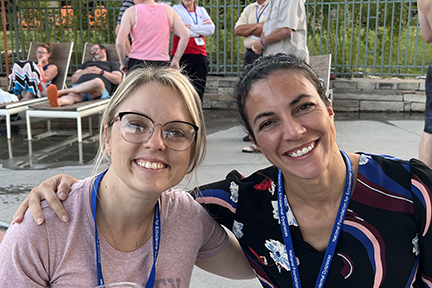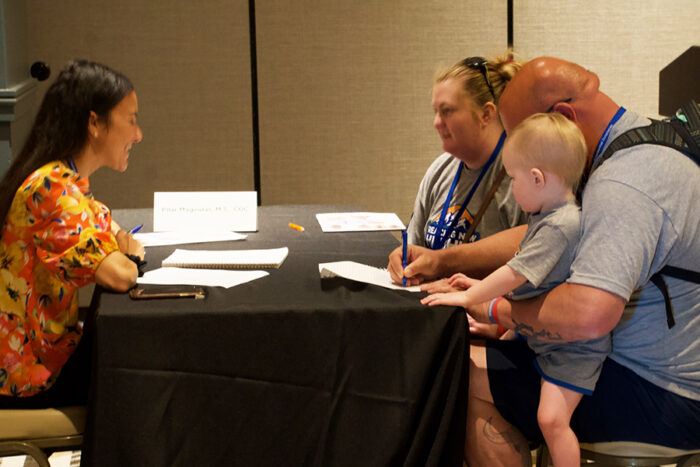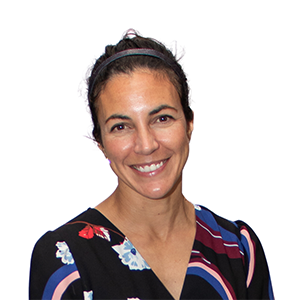Genetic counselors can play an instrumental role in your life as a family with ectodermal dysplasia. Understanding the complicated world of genetics is challenging. That’s why the National Foundation for Ectodermal Dysplasias (NFED) is grateful to have Pilar L. Magoulas, M.S., CGC as a genetic counselor on our Scientific Advisory Council (SAC). She does a tremendous job of explaining genetics in ways you can grasp.
Ms. Magoulas is a Genetic Counselor, Associate Professor, and the Genetics Clinic Manager at Texas Children’s Hospital and Baylor College of Medicine. She also serves as Chief of the Division of Genetic Counseling in the Department of Molecular and Human Genetics at Baylor College of Medicine.

Since 2016, Ms. Magoulas has been volunteering her time to help you learn how ectodermal dysplasias are inherited and what type might affect your family. At NFED Family Conferences, she gives genetic presentations and talks with families one-on-one to answer their questions. She’s also written numerous articles which you can find on our website that address topics like understanding genetics, genetic variants, and why women need to know if they carry the gene variant for x-linked hypohidrotic ectodermal dysplasia.
How She Found Her Career and the NFED
In college, Pilar explored going into medicine but decided it wasn’t the best fit for her. The psychology major took an interest in genetics. She longed to work with people, to connect more with them, establish relationships, and provide psychosocial support. When a professor mentioned genetic counseling, it seemed like the perfect combination of science with the counseling and the psychosocial part.
For me, genetic counseling is taking a really difficult time and trying to not make it better, but make it less difficult for a family. There are so many ways to get news, and if there’s a way that can be done in a way that’s compassionate and provides hope, then that’s what I want to be a part of. I love it!
– Pilar Magoulas
According to Ms. Magoulas, she connected with the NFED through her colleague, Dr. Richard Lewis, who also serves on the SAC. He knew of her work with advocacy and other organizations and suggested her to the NFED as a resource.
“Where I get the most joy is from working with the families either in clinic or outside of clinic,” Ms. Magoulas said. “I am also involved with another advocacy organization and have been since 2006. For me, that’s where I get personal and professional fulfillment. It makes me remember why I got into the field in the first place when you’re dealing with more administrative things or the day-to-day tasks. When I had an opportunity to participate with this group that I wasn’t as familiar with, I welcomed it.”
Why Genetic Counselors Are Needed
Given the rapid expansion of genetics, counselors like Pilar are needed more than ever.
“There’s a huge lack of genetics providers in general. Genetics is starting to become commonplace in all areas of medicine, not just rare diseases, but in all aspects like, cardiology, neurology, cancer and hematology. On top of that, with direct to consumer testing and people doing 23andMe and Ancestry, there’s so much interest in genetics. But, there is such a lack of understanding and interpretation of what they’re getting from that and how it can really impact their health and their family.”
Pilar said it makes her sad that patients often have to wait months to see a genetic provider and get testing. She tries to think of new models where they can increase access for patients, especially for those who live hours from a provider.
“It’s frustrating because we need to see you, provide testing, help and support and give you some answers.”
The Best Route for Genetic Testing
While some families explore consumer testing, Ms. Magoulas recommended that you specifically see a genetics provider for testing for ectodermal dysplasias. She said with more rare disorders, there’s a lot of nuance to the type of testing that you want, and then more so with the interpretation of what you might get back from that.

“That’s where genetics providers can be the most helpful – with test selection. We can help you with understanding the cost, working with insurance, determining medical necessity, looking to see if there are other options. If it’s not covered by insurance, are there research options where we can get it done for free? How do I coordinate testing for other family members? That’s how we can help.”
Given the large number of different types of ectodermal dysplasias, there isn’t just one test if someone is suspected of being affected.
Working with a genetics provider is essential to help decide what test is best out of all the options. Even if we’re thinking it’s ectodermal dysplasias and getting a panel, you need to make sure that the gene that you have in mind is included on that panel, since all panels are different. Some might include seven genes, some include over 100, so even that is very nuanced.
– Pilar Magoulas
“And then with the interpretation, if there’s a change found in one of the genes, we often need to do follow-up testing of parents or other family members, and we can easily coordinate that as genetic providers. We know how to contact the lab to say what can and should be done complimentary and how to send kits to the family. For the logistics, it can be helpful for pediatricians to recognize the symptoms and know when to refer to genetics. “
Why This Genetic Counselor Still Volunteers for the NFED
In her seven years as an NFED volunteer, Ms. Magoulas said she is very impressed by the staff, the organization, the structure and the NFED website. She uses the online resources to share with the families she helps. She finds them informative and written in a way that is understandable to families and easily accessible.
“I love the structure of the organization, where everyone on staff is dedicated and passionate about the cause. It’s beautiful to see, especially when someone might not be directly impacted by an ectodermal dysplasia. Also, the fact that the organization is so large. When you think about other rare genetic syndromes, it’s one condition. Ectodermal dysplasia is a huge group of disorders. And to be able to manage that, to manage the expectations of the families, to be able to throw a conference every year-other organizations do it every two years because of the burden and how much work it is-I’m very impressed.”
Following Her Passions
When she’s not volunteering, Pilar likes to read and is a runner at heart, having run in the Houston Marathon several times. She’s mom to two teenagers, who often accompany her to Family Conferences for the other organization she serves.
“For me, it’s important for them to understand what I do and why I do it. I want to break down the barriers of difference or perceived difference especially for that condition. For them to interact with kids that are different from them, but still kids and siblings who are incredibly compassionate, and just to see kids in that setting at the pool and playing – this is what I love and what I do. It’s not just my job. It’s my passion. And I want them to be part of it, too.”
We thank Pilar for giving of her talents and time to our NFED family!

Tenho 2 filhos com displasia ectodermica. Tenho muita vontade em levá-los ao evento anual